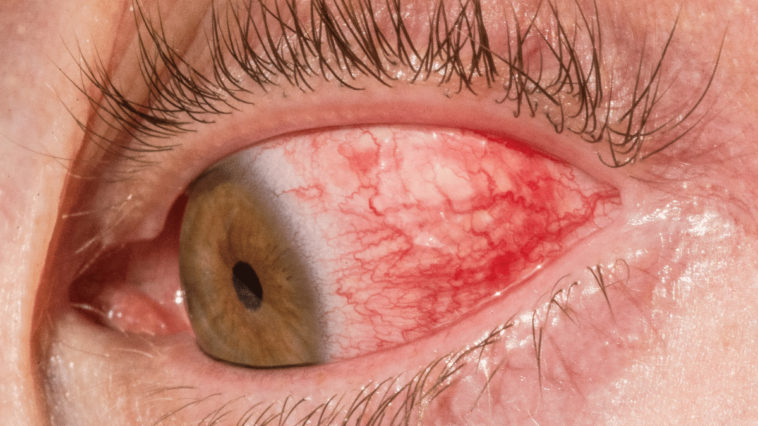Red eyes are a common condition that causes the whites of the eyes to appear bloodshot and red. Several things, including dry eye, allergies, and irritation, can cause red eyes.
Red eyes may signify a more serious medical condition, such as conjunctivitis or glaucoma.
If you are experiencing red eyes and are concerned about your health, you must seek medical advice for proper treatment.
What Causes Red Eyes?
There are many possible causes of red eyes. Some common causes include:
- Allergies: Red eyes can be caused by allergies to pollen, dust, or animal dander.
- Infection: Bacterial or viral infections can cause redness and swell in the eyes.
- A dry eye occurs when the eyes don’t produce enough tears or evaporate too quickly.
- Eye strain: Prolonged use of computers or other electronic devices can cause eye strain, which can lead to red eyes.
- Environmental factors: Wind, dry air, and exposure to irritants like smoke or pollution can all cause redness in the eyes.
- Physical irritation: Foreign objects in the eye, such as a piece of dust or sand, can cause redness and irritation.
- Conjunctivitis (pink eye): Red eyes can be caused by infection or inflammation of the conjunctiva. If you have red eyes, you may feel burning and itching sensations and increased sensitivity to light.
- Uveitis: Red eyes can be a symptom of uveitis, an inflammation of the eye’s middle layer known as the uvea. Uveitis can often cause pain, blurred vision, floaters, and other visual disturbances. Prompt diagnosis and treatment are essential to help prevent long-term damage to the eye and vision loss.
- Scleritis: Red eyes are commonly a symptom of scleritis, which is an inflammation of the sclera. The sclera is the white part of our eye, which lies beneath the cornea and protects the delicate inner structures that form our vision. Scleritis tends to cause red swelling, eye pain, and irritation.
- Episcleritis: Red eyes can be a sign of episcleritis, an inflammation of the episclera, a thin tissue layer covering the sclera. Symptoms can include pain, itchiness, and redness in one or both eyes.
- Subconjunctival hemorrhage: This is a small blood vessel that breaks and bleeds under the conjunctiva, causing redness in the eye.
- Corneal abrasions: A scratch or injury to the cornea can cause redness and discomfort.
If you’re experiencing red eyes and are unsure what’s causing it, it’s a good idea to see a doctor or eye specialist for an evaluation. They can help determine the cause of your red eyes and recommend the appropriate treatment.
How to Get Rid of Red Eyes
Some tips for getting rid of red eyes:
- Use artificial tears: These can help to moisten dry eyes and reduce redness.
- Apply a cold compress: A cold compress can reduce inflammation and swell in the eyes.
- Avoid rubbing your eyes: Rubbing them can irritate and worsen the redness.
- Get plenty of rest: Getting enough sleep can help to reduce redness and fatigue in the eyes.
- Use a humidifier: A humidifier can add moisture to the air, reducing dryness and combating dry eye conditions, which can cause redness. With regular use, this simple device can help noticeably reduce redness in the eyes over time.
- Avoid irritants: To prevent red eyes, it is essential to avoid irritants like smoke, pollution, and strong gusts of wind. Staying away from these substances can help keep your eyes healthy and reduce their likelihood of becoming bloodshot or irritated.
- Take breaks from screens: Prolonged use of computers and other electronic devices can cause eye strain, leading to redness. Taking regular breaks can help to reduce eye strain and redness.
If you’re still experiencing red eyes after trying these steps, it’s a good idea to see a doctor or eye specialist for further evaluation. They can help determine the cause of your red eyes and recommend the appropriate treatment.
Red Eyes Complications?
Red eye can be a symptom of many different conditions, and the potential complications depend on the underlying cause. Here are some possible complications of a red eye:
- Vision loss: Some eye conditions that cause red eye, such as uveitis or scleritis, can lead to vision loss if left untreated.
- Corneal damage: Conditions that cause redness and irritation in the eye, such as dry eye or corneal abrasions, can lead to damage to the cornea if left untreated.
- Eye infections: Bacterial or viral infections of the eye can lead to complications such as inflammation, scarring, and vision loss if left untreated.
- Allergic reactions: Allergic reactions can cause redness, itching, and swelling in the eyes, which can be uncomfortable. In severe cases, allergies can lead to anaphylaxis, a potentially life-threatening condition.
If you’re experiencing red eyes and you’re concerned about possible complications, it’s essential to see an eye specialist for an evaluation. He helps determine the cause of your red eyes and recommends appropriate treatment to prevent potential complications.
How Can You Prevent Eye Redness?
Several steps you can take to help prevent eye redness are the following:
- Practice good hygiene: Red eyes can result from bacteria or irritants on the hands, which are spread to the eyes when rubbed. To avoid this and help prevent redness, regularly wash your hands and avoid rubbing your eyes.
- Protect your eyes from the sun: It is recommended that you wear sunglasses to cover your eyes, to protect yourself from the sun’s dangerous UV rays, and avoid red eyes,
- Use artificial tears: If you spend a lot of time on the computer or in dry environments, consider using artificial tears to keep your eyes moist and reduce redness.
- Avoid irritants: Avoid exposure to smoke, pollution, and other irritants that can cause eye redness.
- Get plenty of rest: Get enough sleep and take breaks from screens and other activities that can strain your eyes.
- Eat a healthy diet: Eating a balanced diet is essential for maintaining eye health and preventing red, inflamed eyes. Consuming plenty of fruit, veggies, and other nutrition-rich foods can reduce your chances of experiencing redness in the eyes.
- Drink plenty of water: Staying hydrated can help to keep your eyes moist and reduce the risk of redness.
By following these steps, you can help to prevent eye redness and maintain healthy eyes.
When Should You Contact a Doctor?
There are several potential causes of red eyes, and the appropriate treatment will depend on the underlying cause. Here are some general guidelines on when you should contact a doctor for red eyes:
- Suppose your red eyes are accompanied by severe pain, vision changes, or discharge. In that case, you should contact a doctor as soon as possible, as these symptoms can be signs of a severe condition that requires prompt medical attention.
- Red eyes can indicate a range of underlying problems. If accompanied by other symptoms, such as a fever, coughing, or sore throat, it is essential to seek medical advice to identify the cause and get appropriate treatment.
- If your eyes remain red for more than a few days with no other symptoms, you may need medical attention to find the right treatment option.
In general, if you are concerned about your red eyes or if they are causing discomfort or affecting your vision, it is a good idea to contact a doctor to discuss your symptoms and get a proper diagnosis.






